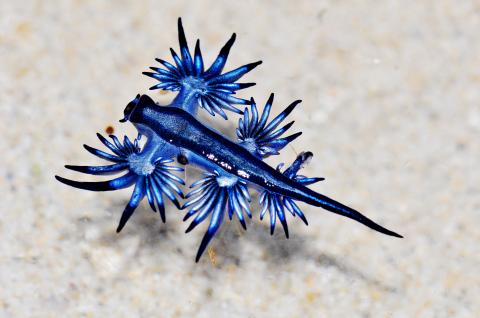The discovery of a distinctive sea slug off Siaoliouciou Island (小琉球) in Pingtung County is shedding light on climate change, a scientist said.
Although Glaucus atlanticus, the only member of the genus Glaucus, is usually found in tropical areas, it had never previously been spotted in Taiwanese waters.
Wang Tien-cheng (王添正), a bed-and-breakfast owner and tour guide, noticed a group of about 60 Glaucus atlanticus near the Duozaiping intertidal zone (肚仔坪潮間帶), while taking some customers on a tour.

Photo: Courtesy of Lo Liu-chih
The 37-year-old Wang also has 11 years of experience guiding underwater snorkeling tours and he often posts pictures of the scenic beauty of the island on his Facebook page.
After giving some of the slugs to Lo Liu-chih (羅柳墀), an assistant professor at National Kaohsiung Normal University’s department of geography, Lo’s research team confirmed that it was the first time Glaucus atlanticus had been seen in the Siaoliouciou area.
Announcing the discovery on Sunday, Lo said that Glaucus atlanticus was first discovered in 1777 by European academics.
Pointing to the slug’s three pairs of symmetrical, protruding hand-like limbs, as well as its vibrant blue tail, Lo said these feature has contributed to the origin of the slug’s name.
The Europeans who discovered the sea slug felt it resembled Glaucus, a fisherman in Greek mythology who after ingesting a magical herb which could bring fish back to life, became immortal and grew fins in place of his arms and legs, according to Roman poet Ovid.
Lo said warming seawater caused by climate change could explain the northward migration of Glaucus atlanticus, but he added that an abundance of Portuguese man-o’-war — the sea slugs favored prey along with velella, a type of jellyfish — in the waters around Siaoliouciou could also account for the presence of the sea slug.
Glaucus atlanticus are immune to the man-o’-war venom and they even have an organ which allows them to store the venom, giving the sea slugs the ability to deal a far stronger sting than the man-o’-war,
Lo warned that any observation of the slug should be done with extreme caution.
Lo also said people should avoid coming into physical contact with the slug and added that Glaucus atlanticus is not edible.
Translated by Jake Chung, staff writer

Taipei has once again made it to the top 100 in Oxford Economics’ Global Cities Index 2025 report, moving up five places from last year to 60. The annual index, which was published last month, evaluated 1,000 of the most populated metropolises based on five indices — economics, human capital, quality of life, environment and governance. New York maintained its top spot this year, placing first in the economics index thanks to the strength of its vibrant financial industry and economic stability. Taipei ranked 263rd in economics, 44th in human capital, 15th in quality of life, 284th for environment and 75th in governance,

The Sports Administration yesterday demanded an apology from the national table tennis association for barring 17-year-old Yeh Yi-tian (葉伊恬) from competing in the upcoming World Table Tennis (WTT) United States Smash tournament in Las Vegas this July. The sports agency said in a statement that the Chinese Taipei Table Tennis Association (CTTTA) must explain to the public why it withdrew Yeh from the WTT tournament in Las Vegas. The sports agency said it contacted the association to express its disapproval of the decision-making process after receiving a complaint from Yeh’s coach, Chuang

Control Yuan Secretary-General Lee Chun-yi (李俊俋) tendered his resignation last night, admitting that he had misused a government vehicle, as reported by media. His resignation was immediately accepted by the Control Yuan. In a statement explaining why he had resigned, Lee apologized for using a Control Yuan vehicle to transport his dog to a pet grooming salon on May 20. The issue first came to light late last month, when TVBS News reported that Lee had instructed his driver to take the dog to the salon. The news channel broadcast photos that it said were taken by an unnamed whistle-blower, which purportedly showed the

A former officer in China’s People’s Liberation Army (PLA) who witnessed the aftermath of the 1989 Tiananmen Square massacre has warned that Taiwan could face a similar fate if China attempts to unify the country by force. Li Xiaoming (李曉明), who was deployed to Beijing as a junior officer during the crackdown, said Taiwanese people should study the massacre carefully, because it offers a glimpse of what Beijing is willing to do to suppress dissent. “What happened in Tiananmen Square could happen in Taiwan too,” Li told CNA in a May 22 interview, ahead of the massacre’s 36th anniversary. “If Taiwanese students or